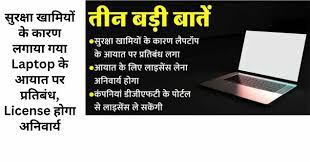
The central government has banned the import of laptops, tablets, all-in-one personal computers, and ultra-small computers and servers due to inherent security flaws. A notification in this regard was issued by the Directorate General of Foreign Trade (DGFT) on Thursday. However, they can be imported with certain conditions.
Sources say India has sufficient capacity to manufacture IT hardware equipment and the requirement of buyers' permission to import these products will not affect domestic availability in any way, reported news agency PTI. Sources said the government is determined to ensure that the internet in India is 'open, secure and reliable and accountable' for all users. With the expansion of the internet and more and more Indians coming online, the potential for cybercrime has also increased. Various incidents of cyber security threats have also come to the fore.
Banned due to security flaws
Inherent security flaws in IT hardware such as hardware backdoors and firmware malware could potentially put sensitive personal and enterprise data at risk, say sources. Providing secure hardware is the foundation of security. The government has imposed these restrictions to protect the security interests of the country and its citizens. According to sources, the non-tariff barrier is not a ban on imports. Companies or traders can import IT hardware equipment after obtaining a valid license from DGFT.
license required for import
DGFT has created a portal, and companies/traders can apply online for obtaining licenses. DGFT will issue the license within 3/4 days if the application is made and the information is correct.
Companies can get partial relief
IT ministry sources said the government may give more time to companies to apply for licenses to import laptops and other products, thereby extending the prescribed deadline for import restrictions. This step can give partial relief to the companies. However, no information has come about how long the deadline can be extended, nor has the government officially announced it. Sources said the deadline could be extended for a month or more. He said that DGFT may soon issue a notice on this.
Why were these restrictions imposed?
The move has been taken to promote domestic manufacturing of these products under the recently renewed Production-Linked Incentive (PLI) scheme for IT hardware. Also, with this decision of the government, the incoming shipments of these goods from countries like China and Korea have been curtailed. Inherent security flaws are also being cited as the reason behind the ban on the import of these products. Union minister Rajeev Chandrasekhar says India's decision to introduce licensing requirements for the import of laptops, tablets, and personal computers will boost domestic manufacturing.
This is why the government imposed a ban on imports
The government has not said anything clearly regarding the ban on the import of laptops, tablets, and computers, but the first reason for these restrictions may be to promote Made in India. At the same time, some hardware can potentially have security problems, regarding which this restriction has been imposed. Products under embargo will now require a license or permission from the government for import.
These products have been banned
The government has banned the import of seven categories of electronic gadgets falling under HSN 8741, including laptops, tablets, all-in-one personal computers, and ultra-small computers and servers. Explain that the Harmonized System of Nomenclature (HSN) code is a classification system used to identify and tax products.
What did the government say in the notification?
In this notification issued by the government, it has been said that the import of laptops, tablets, all-in-one personal computers, and ultra-small computers and servers has been banned with immediate effect, although they will be imported with certain conditions... This notification was issued by the Directorate General of Foreign Trade (DGFT).
On behalf of the ministry, it has been said that import will be allowed with a condition that the imported goods will be used only for the stated purposes and will not be sold. Further, the condition also includes that the products will be destroyed or re-exported after use. Also, any such import would require a license.
(pc mharahariyana)










